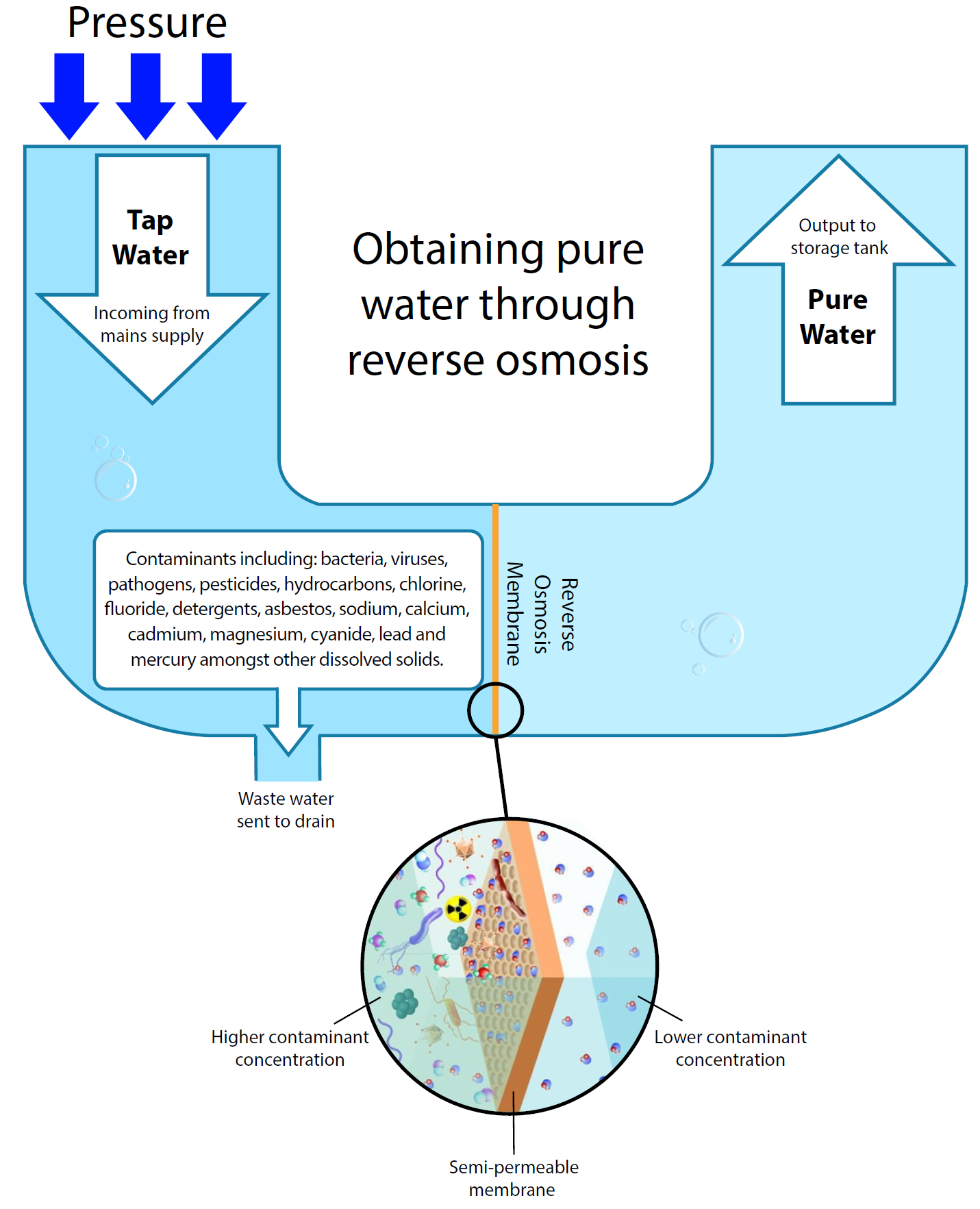Posted by Andrews Water Treatment on 30th Jan 2019
What is a Reverse Osmosis System?
A reverse osmosis system (RO system) is a means of treating water for an enhanced purity. It uses an advanced process of purification to actively remove roughly 98% of contaminants and 99% of bacteria from standard mains supply tap water.
How does Reverse Osmosis Work?
Reverse osmosis is an effective means of water purification because of its unique mechanism for removing unwanted and often tiny particles.
The high-level filtration method in RO systems is the reverse of osmosis, which is a common scientific term for the diffusion of a solvent from a solution (high water concentration) to a solution (low water concentration) through a semi-permeable membrane, resulting in extraction of impurities.
How Does a Reverse Osmosis System Work?
Using the reverse osmosis process mentioned above an RO system takes incoming tap water, passes it through the membrane, removing the impurities which are rejected and piped to a drain. The pure water then passes through to the holding tank for usage.

Reverse Osmosis Systems will generally consist of several other filter types to create a multi-stage filter. These can include:
Mechanical Sediment Filter
This pre-filter stage has the purpose of removing the unwanted sediment, silt, and dirt, before they reach the more delicate membrane.
Carbon Filter
The carbon filter primarily works on reducing the amount of chlorine and other contaminants that can both damage the RO membrane and cause your water to have an unpleasant taste and odour.
Reverse Osmosis Membrane
The semi-permeable membrane is the most important phase of the purification process, removing the vast majority of chemicals, metals and bacteria.
Post Filter
With some more specialised RO systems, a post filter (carbon filter) will filter out some gasses and tastes that may have been picked up from the pressurised storage tank.
Why do you need a Reverse Osmosis System?
Simple water filters are sufficient for improving taste and smell but they can’t remove many of the impurities found in our water supply.
RO systems are especially well-suited to removing impurities including microscopic organisms as well as heavy metals such as lead and copper. They can also effectively limit microplastics which can be present in our water supply.
Though units of this type are traditionally used for domestic drinking water and for aquatic use, the extremely high levels of filtration (up to 99.9% with some multi-stage filters) means they are well-adapted for specialist applications for the food, coffee and even dental and veterinary applications. Each RO system has different purification capabilities, so it’s worth checking the model to see if it is effective on the specific contaminant you wish to remove.
Other benefits of an RO system include:
Effective Against Limescale
Reverse osmosis removes the minerals that when heated can cause a limescale build up. This is particularly relevant in areas with ‘hard’ water such as the South East of England.
Easy to Install
RO systems are straightforward to install by a plumber or someone with advanced DIY skills. some specialist systems designed for example for coffee shops we would always recommend a specialist to install.
Cheap to Run
Whilst having a larger initial outlay than many water filters, RO systems are inexpensive to run due to the fact they use pressurised water and don’t require any additional power. Their running costs can regularly equate to around 2p per litre (compare that to the price of bottled water!)
Easy to Maintain
In some reverse osmosis systems, filter changes are quick and simple to carry out, whilst the lack of moving parts often makes general cleaning and maintenance far easier than other types of filter.
What types of RO System are there?
There are several different types of RO system, which are mainly based around different types of domestic or commercial applications.
If you require an RO system for a highly-specialised water purification task such as for the general food-service market or want to know about specific chemical elements each system can remove, please contact us directly.
Domestic RO System
Designed for under-sink use in households, domestic RO systems can give you peace of mind about the drinking water from your own dedicated tap.
These systems are particularly well-suited to households that receive hard water or even rely on a private water supply as the purification membranes resist harmful bacteria which can be present in less regulated water networks.
An entry level system is the Total Purity system: a 4 stage domestic reverse osmosis (RO) system. It has a 50 US gpd maximum output and comprises of a sediment pre-filter, carbon pre-filter, membrane and post carbon filter.
Dental RO System
A dental RO system produces an extremely high level of water purification, ideal for use in an autoclave providing effectively risk-free water for patients.
These specific systems such as the Rhombus offer a far more cost-effective solution to the distillers required to produce water for Autoclaves, and output the same level of water purification.
Veterinary RO System
Similarly to Dental surgeries, more and more veterinary professionals are using RO waters systems to output purified water for their autoclaves because of the cost reductions compared to their old distillers. A veterinary RO system can output the same water quality as a distiller, without the high electricity costs.
RO Replacement Filters & Membranes
Once you have purchased an RO system, you will need to check the manufacturer’s guidelines on when the filter/s and membrane need to be replaced to keep the system working correctly.
RO replacement filters and membranes can be bought and installed to get your system working back at its full potential.
Unsure of Which RO System you Require?
Due to the wide variety of options and systems set up to specialise in a particular field, choosing an RO system can be a difficult task. If you would like any advice on the best RO system for your specific needs, please contact the Andrew’s Water Team today.
 Loading... Please wait...
Loading... Please wait...



